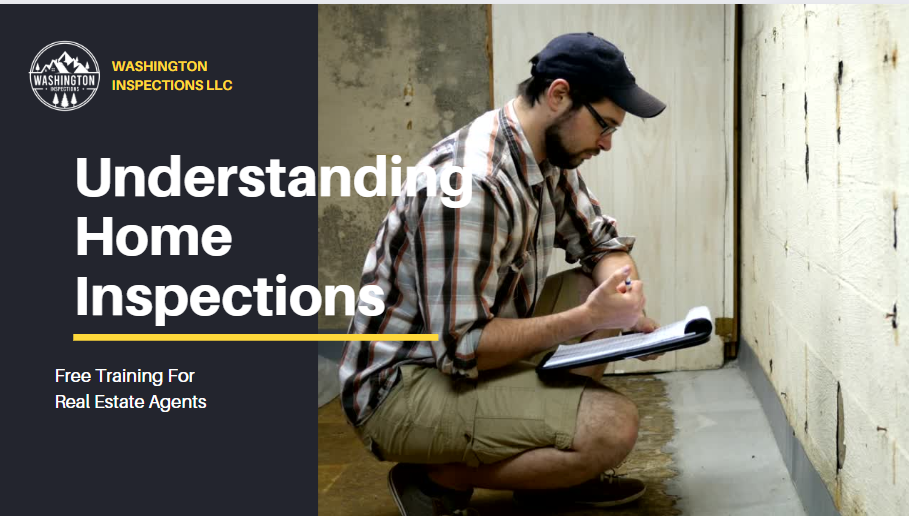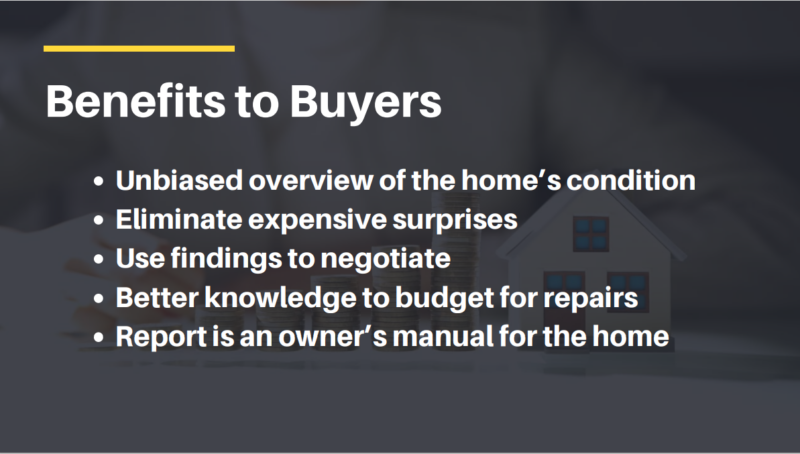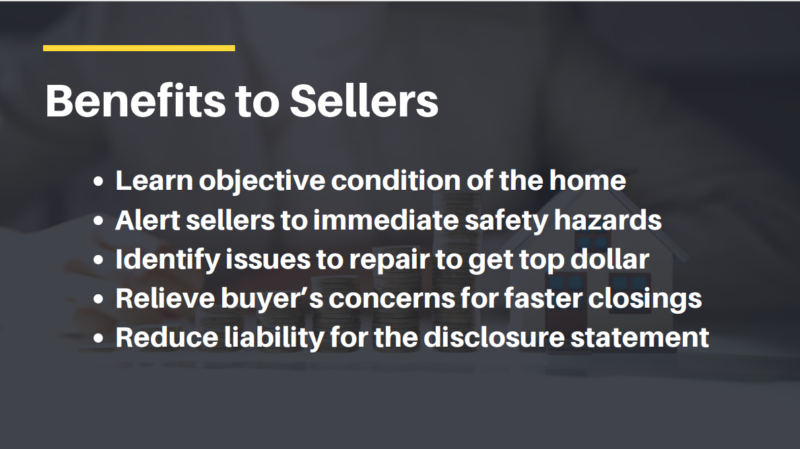
Don’t let home inspections kill your deals. A better understanding of home inspections will protect your buyers and sellers. And clarifying expectations ensures smoother transactions and faster closings.
Welcome to our free training for real estate agents to better explain home inspections to your clients.
We know your time is valuable, so let’s get right into it.
What is a home inspection?
A home inspection is an unbiased visual inspection of a house and a test of critical systems to determine its general condition.
Home inspections are typically performed during transfers of property ownership. However, they’re also done for landlords, tenants, builders and others.
A home inspection is NOT a warranty or guarantee of any system or component. It is just a snapshot of the home’s condition at the time of the inspection.
Types of Home Inspections
There are 3 primary types of home inspections that residential real estate agents should be aware of.
A buyer’s pre-purchase inspection is the most common. After the buyer gets the home under contract, they hire a licensed home inspector to closely observe the home and report material defects. Buyer’s receive a comprehensive report with images and videos.
The second type, is a pre-listing inspection for sellers. There are many benefits for your sellers to get a pre-listing inspection. Mostly, it eases the concerns of potential buyers.
The third type of residential inspection is a less formal walkthrough consultation. This is where an inspector joins the client on a walkthrough of a property to discuss the condition of the home. These consultations cost less because there isn’t a written report.
There are also a few other less common types of inspections like new construction warranty inspections, safety and maintenance inspections for landlords and property managers, and commercial and multi-unit building inspections.
Why should buyers get a home inspection?
There are many benefits for buyers, such as….
Inspections provide an unbiased overview of the home’s condition.
They eliminate expensive surprises by revealing material defects.
Their findings can be used to negotiate concessions before the closing.
They provide better knowledge to budget for repairs.
And, finally, the inspection report is like a home owner’s manual with key information like the location of critical shut off valves, serial numbers for all appliances, areas to monitor for wear and tear, and recommendations for maintenance.

Why should sellers get pre-listing inspections?
First, an inspection is a view of their home’s condition through an objective third party.
They can alert sellers to safety hazards of immediate personal concern.
Next, inspections identify issues that could be repaired before listing to get top dollar.
They also relieve buyer’s concerns and may get them to waive inspection contingencies to close faster.
And, finally, they reduce liability by adding professional documentation to a sellers disclosure statement.

What exactly do home inspectors inspect?
Inspectors observe and test all major systems of the home, including:
The roof with its covering material, flashing, flues, chimneys, vents, skylights and rain gutters.
The exterior with the site drainage, flatwork, foundation, siding, windows, doors, porches, decks and more.
The interior, including the walls, windows, doors, cabinets, stairs, flooring, basement, attic, insulation, ventilation, and more.
And the inspector checks critical systems like HVAC, plumbing, and electrical by using normal operating controls and special tools to measure their effectiveness.
What home inspectors do not do?
They do not move occupants’ belongings to gain access to any area.
They can’t see through walls.
They can’t operate systems that don’t respond to normal controls.
They won’t enter potentially dangerous areas.
They don’t test for environmental hazards.
They won’t give exact repair estimates.
And they won’t make recommendations to buy or not to buy the home.
What qualifications do home inspectors have?
Home inspectors in Washington state must be licensed. This requires extensive classroom work and field training, and passing national and state exams.
Home inspectors may also be certified by professional organizations which require additional schooling, training, testing, and ethical commitments.
Home inspectors usually have some background in building or home improvement trades.
And, finally, home inspectors carry professional liability insurance. Some even offer guarantees.
How much does a home inspection cost?
Costs range from around $400 to $600 for the average home. The difference in cost is primarily due to the size of the home.
Condos and townhomes are the least expensive, around $350 to $500, because they tend to be smaller and have less to inspect on the exterior.
Inspecting single family homes up to 2500 square feet costs around $500.
Homes larger than 2500 square feet may cost bit more. And there is usually an additional cost to inspect detached outbuildings.
What other services do home inspectors offer?
There are a few hidden, or add on costs, to home inspections that agents should be aware of.
Inspectors may offer additional services that are not part of a basic home inspection. Services like Water Quality Tests, Radon Tests, Mold Tests, Sewer Scopes, Pest Inspections, Septic and Well Inspections, Thermal Imaging, etc. These services cost more because they require specialized equipment and more time to execute.
Other frequently asked questions your clients may ask
Are home inspections required by law or by lenders? The answer is, no. But they are highly recommended to protect their investment.
How long do inspections take? The answer is around 2 to 3 hours for the average home. It takes less time with a two-person inspection team.
Do clients need to be present? No, but it’s preferable. If a client can’t attend the inspection, a brief walkthrough or phone call summary of the findings is best.
Do clients get a physical report? Today, most reports are only delivered digitally because they usually contain videos that are essential to the report.
Well, there you have it. Almost everything you need to know about home inspections to better serve your clients.
There’s still one secret you should know about home inspections to be an effective agent. Clients don’t really want a home inspection, or a detailed report. What they really want, is peace of mind that they aren’t buying a money pit. What they want is their concerns to be addressed and relieved. Remember that, when discussing inspections with them.
If you want the best for your clients in Pierce, Kitsap, Thurston, Mason, and southern King County in western Washington, we want to work with you.
By Washington Inspections LLC –“Better inspections in half the time” with 2 licensed inspectors per job. Father-son team. Certified and licensed home inspectors in Gig Harbor and Tacoma and primarily service Kitsap, Pierce, Thurston, Mason and S. King Counties.